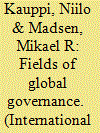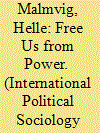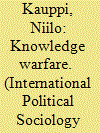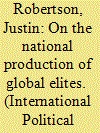|
|
|
Sort Order |
|
|
|
Items / Page
|
|
|
|
|
|
|
| Srl | Item |
| 1 |
ID:
134377


|
|
|
|
|
| Summary/Abstract |
This article introduces Adriana Cavarero's concept of “horrorism” into International Relations (IR) discussions of the relationship between war and citizenship. Horrorism refers to a violent violation of vulnerable humans who are defined by their simultaneous openness to the other's care and harm. With its motif of physical and ontological denigration, horrorism offends the human condition by making its victims gaze upon and/or experience repugnant violence and bodily disfiguration precisely when the vulnerable are most in need of care. The article argues that horrorism complicates disciplinary understandings of contemporary violence which tend to see terrorism, but not horrorism, in war and which generally neglect to theorize how violence—and particularly horrorism—is embedded in, and exchanged, through state/citizen relationships. To elaborate these arguments, the article analyses three pieces of war art: Jeremy Deller's “Baghdad, 5 March 2007,” Donald Gray's mural, “Operation Iraqi Freedom,” and a still image from Cynthia Weber's film, “Guadalupe Denogean: ‘I am an American.’” By taking the War on Terrorism as their subject, these pieces demonstrate how war makes visible the terror and horror in state/citizen relationships. The article concludes by reconsidering how encountering signs of horrorism might broaden our frames of war and further our empathic vision toward the precarious victims of horrorism or, alternatively, might confirm the patriotic allegiances of imperial citizens in ways that further bind their citizenship to state political and economic violence and narrow the scope for genuine empathy.
|
|
|
|
|
|
|
|
|
|
|
|
|
|
|
|
| 2 |
ID:
134383


|
|
|
|
|
| Summary/Abstract |
To make global governance intelligible, we need to study a neglected abut crucial phenomenon namely the development of the social division of labor, both in transnational society and more specifically with regard to the fields of politics, law and economics. This nation of a social division of labor has to be distinguished from the mere technical division of labor. The process in question is not merely one of differentiation in an ever more complex world, nor does it take place in a relative power vacuum.
|
|
|
|
|
|
|
|
|
|
|
|
|
|
|
|
| 3 |
ID:
134380


|
|
|
|
|
| Summary/Abstract |
For over a decade, Arab governments have been enrolled into EU initiatives aimed at promoting democratic reform in the region. Common to these initiatives are their claims to be uninvolved with power and external imposition, professing instead to be based on voluntary notions of local demand and ownership. This article challenges this core liberalist assumption of the absence of power. Drawing on Foucault's reflections on liberal governmentality, it shows how power operates through a technology of “contractualization” which produces a distinct Arab subjectivity in the form of a lack (of reform will). Yet governing technologies are never complete, and possibilities of reversal and resistance always exist. In the second part, the article engages with the emerging debate on Foucault's concept of counter-conduct, opening up the concept to more subtle and less spectacular forms of resistance. Drawing inspiration from Derrida's analysis of (in)hospitality and Baudrillard's logic of simulation, the article shows how the liberal assumptions of “invitation,” “ownership,” and “gradualism” inherent in European reform initiatives enable resistance in the form of: (i) selection of entry; (ii) setting conditions; and (iii) simulating reform.
|
|
|
|
|
|
|
|
|
|
|
|
|
|
|
|
| 4 |
ID:
134378


|
|
|
|
|
| Summary/Abstract |
While the rise of “resilience” as a strategic concept has been widely noted, critical security scholars have given it a frosty reception, viewing it as a vehicle and multiplier of neo-liberal governmentality. This article acknowledges that resilience does form part of a neo-liberal security regime, but argues that a shift from defense to resilience is not devoid of critical potential, and develops recent calls for critique to be made more context specific. It begins by arguing that blanket condemnation of resilience is part of a wider tendency to apply Foucault's “governmentality” concept as a particular global form of power, rather than as an empirically sensitive analytic framework open to different configurations of power. It then shows how resilience also forms part of a strategy to manage uncertainty—particularly in relation to coping with global environmental risks—which directly challenges neo-liberal nostrums. A comparison with the concept of “defense” is made, arguing that resilience, while problematic for other reasons, potentially avoids the pernicious us-them logic, exceptionalism, and short-termism characteristic of defense strategies.
|
|
|
|
|
|
|
|
|
|
|
|
|
|
|
|
| 5 |
ID:
134386


|
|
|
|
|
| Summary/Abstract |
The emergence of a global structure of judicialized international law in closely linked to more general effort throughout the 20th and early 21st centuries to establish an international community by law. While the proliferation of international courts (ICs) and its consequence has been described elsewhere (Romano 1999; Koskennienmi and Leino 2002; alter 2014), we know surprisingly little about the judges sitting at the helm of contemporary judicialized international law and quite literally ruling (on) the world.
|
|
|
|
|
|
|
|
|
|
|
|
|
|
|
|
| 6 |
ID:
134385


|
|
|
|
|
| Summary/Abstract |
The future of the worlds depends on the knowledge we have of it. Keynes famously added to this that the world is ruled by the ideas of economists and political philosophers- and little else. Bur while nobody would dispute the power of idea, Keynes forgot to add that ideas are always somebody’s ideas. Social group seek to monopolize the ideas they consider valuable and to discredit those that are a threat.
|
|
|
|
|
|
|
|
|
|
|
|
|
|
|
|
| 7 |
ID:
134379


|
|
|
|
|
| Summary/Abstract |
A small but dominant group of global financial elites has been trained in France. These elites hold powerful positions in the global derivatives industry, most prominently in the field of equity derivatives. The specialized French role is both a cause and a consequence of the intensifying use of derivatives, one of the major developments in global financial capitalism. Equity derivatives have spread from France to Europe, and now to Asia, with London and Hong Kong serving as control centers. Three factors are key in explaining the French niche in global derivatives. First, particular characteristics of national systems, in this case highly advanced French mathematics education, can spawn market dominance in specific areas of the global economy. Second, French networks, founded on shared experiences in French schools and French banks, are both relatively closed and highly portable across national borders. Third, new actors in developed and developing regions of the global economy are driving demand for derivatives products that are designed by French trained elites in French banks and especially in global banks. The global financial crisis has neither derailed the demand for derivatives nor, consequently, the role French engineering schools play in educating some of the top global financial practitioners.
|
|
|
|
|
|
|
|
|
|
|
|
|
|
|
|
| 8 |
ID:
134382


|
|
|
|
|
| Summary/Abstract |
Beginning with a recurrent discussion about the choice between two imagined Star Trek technologies, the holodeck and the transporter, this article explores how popular culture can be revealing of ways in which political possibilities are variously made and foreclosed by dint of deeply held but underinterrogated ideational commitments circulating in the mundane and carried forward by what might seem unlikely voices. Tracing a few such commitments as they pertain to the legitimation and delegitimation of political subjecthood, we examine the political stakes of questions of agency and delusion through what were initially reported to have been the June 2006 suicides of three detainees at the US base at Guantanamo Bay, Cuba, and the crisis that emerged with respect to multiple hunger strikes at that same facility some seven years later. Through these we ask whether there might be resistance-enabling possibilities as yet unimagined in agential choices that can so deeply offend prevailing sensibilities that it is sometimes difficult to abide them as valid choices at all. As we struggle with these resurgent security politics, it might seem frivolous to turn to film and television, or pub games at conferences, for guidance. What this article demonstrates is that these popular renderings of the limits of acceptable subjectivity draw on deep currents in our very broadest culture. In a very real sense, we are all very well prepared for our present political rendition.
|
|
|
|
|
|
|
|
|
|
|
|
|
|
|
|
|
|
|
|
|